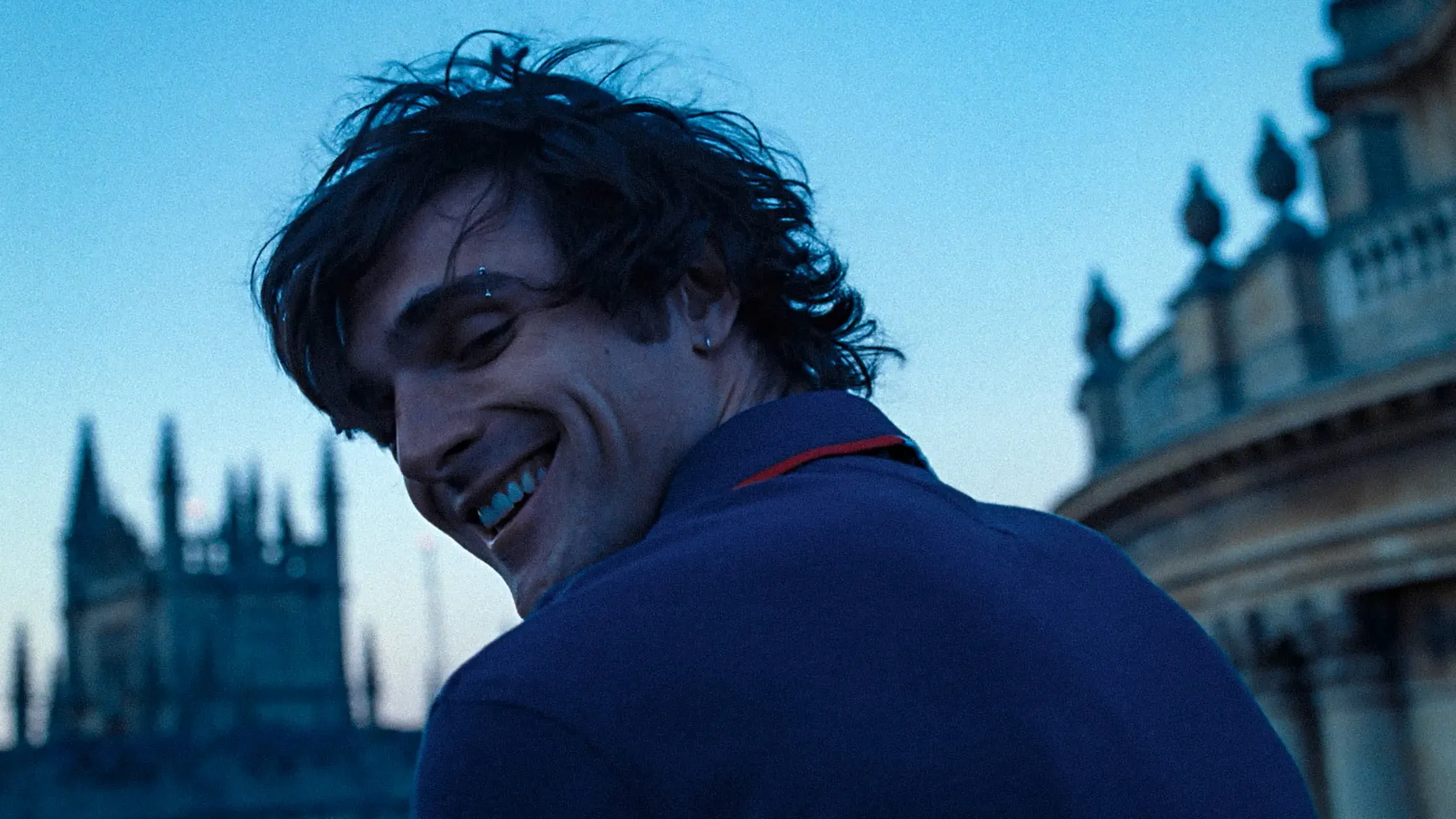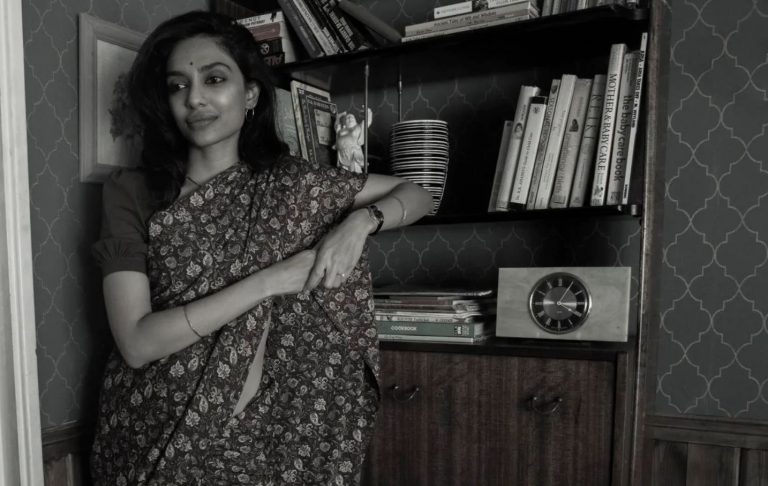Few directorial debuts establish an artist’s signature as successfully as Emerald Fennell’s Oscar-winning “Promising Young Woman.” That film’s colorful posh-punk aesthetic is a natural fit for “Saltburn,” an erotic class satire backdropped against the mid-aughts’ intersection of prep and grunge youth cultures. Charged with the irreverent energy of a baroque Sex Pistols concert, Fennell’s highly awaited sophomore effort takes a barrel of neon paint to the English aristocracy and coats it in ticker tape.
Meeting the bespectacled Oliver Quick (Barry Keoghan) on his first day of Oxford, you may be reminded of a certain young, curiously scarred wizard. That, it turns out, is no accident, as “Harry Potter” is one of several millennial artifacts Fennell aims to subvert, not unlike the way “Promising Young Woman” incorporates rom-com conventions just to upend them. Ollie, too, escapes a torturous existence by running away to a medieval castle where he discovers a magical new world of possibility – only at Saltburn, sex and glamor stand in for Patronus charms and Quidditch.
Unpacking near his dorm-room window, he spots Felix Catton (Jacob Elordi), the wealthy, handsome classmate he’ll soon befriend and grow to privately, obsessively adore. In this heartthrob who rocks an eyebrow stud as effortlessly as he does an enviable collection of pastel v-neck sweaters, the class-conscious Oliver senses a carefree self-possession he desperately wants but can never have. For Felix, the “scholarship boy who gets his clothes at Oxfam” provides a passing voyeuristic thrill, even if he’s too kind-hearted to realize it.
Just as “Promising Young Woman’s” avenging angel ensnared her marks by fulfilling their expectations of her, Oliver shovels Felix with poverty porn until the latter’s noblesse oblige compels an invitation to his family’s country estate for the summer. What follows our arrival at the mansion from which the movie derives its title is part absurdist fish-out-of-water comedy, part psychosexual thriller, and shot by “Babylon” DP Linus Sandgren to look like a dark fairytale.
The clever and well endowed Oliver has no shortage of amusement for Felix’s parents Elsbeth and Sir James (delightful and under-deployed comedic duo Rosamund Pike and Richard E. Grant) and sister Venetia (Allison Oliver), upstaging their American cousin Farleigh (Archie Madekwe). His proximity to wealth may be closer than our protagonist’s but is just as conditional. After getting tricked by his rival into singing Pet Shop Boys’ “Rent” at a karaoke party, an embarrassed Ollie tells him to take the second verse. “This is your song, too.” The fate of a minor character (Carey Mulligan in a cameo) demonstrates early on how bitter exile from Saltburn can be, and both jesters of the Catton family court desperately wish to avoid tasting it firsthand. But there’s only so much one can do to “pass” in a world that doesn’t belong to them.

In multiple interviews, Fennell has talked about wanting to make a movie that explores sexual tension between beauty and ugliness: “I think there’s always, when you’re kind of gripped by something completely overwhelming and otherworldly desire, there’s this element of revulsion.” This question (“Did I love him? Was I in love with him? I loved him, I hated him”) bookends the film and in between is referenced visually by the crushed beer cans and vomit that litter cobblestone riverbanks and porcelain-white bathrooms. Moreover, Oliver’s attraction toward Felix is consummated through a viscerally repulsive act that is sure to elicit a collective audible reaction in any packed house.
That’s part of the fun, but “Saltburn’s” insistence on continuing to shock viewers begins generating diminishing returns as the narrative thins. By the time Oliver commits sacrilege in a static long-take, it’s difficult not to wonder, “Whom is this meant to titillate? The one poor soul who wanders in expecting ‘Downton Abbey’?” The moment isn’t overly disgusting or offensive – it’s just boring.
The intoxicating atmosphere cast by an excellent curation of mid-aughts alternative tracks, block-stripe polos, and Sandgren’s dewy nighttime compositions, which look straight out of some Euro-gothic classic from the ‘70s, simply doesn’t compensate for a fumbled third act that resorts to provocation the fewer things it has to say. Not since 2019’s “Joker” have a movie’s “twists” been this telegraphed and, nevertheless, overly explained. While “Promising Young Woman’s” disorienting denouement delivered the thrill of seeing something as iconoclastic as “Pulp Fiction” for the first time, “Saltburn” is painfully predictable. But then that final shot, destined for meme-hood and inclusion on any highlight reel of Keoghan’s career, blazes onto the screen and convinces you, if only for a moment, that you’ve just seen a great movie. You’ll never listen to Sophie Ellis-Bextor’s “Murder on the Dancefloor” the same way again.
Many reviews of “Saltburn” call it a stylistic upgrade to Fennell’s debut, but there’ll be none of that here. “Promising Young Woman” is a terrifically blocked, vibrantly color-graded and edited piece of filmmaking. Compare any of “Saltburn’s” conversational shot-reverse shots to those in Dean Walker’s office and decide for yourself which movie provides more to savor on a frame-by-frame basis. Predisposed to close-ups and shot in boxy academy ratio but without an evocative palette (for better examples of CUs in 4:3, watch Lukas Dhont’s “Close” and Andrea Pallaoro’s “Monica”), “Saltburn” falls short of the visual feast promised on paper by Fennell’s collaboration with Sandgren, among the three greatest cinematographers working today – which isn’t to say the movie is without flair. But Fennell’s freshman feature, both stylistically and structurally, looks more like what you’d expect from a bold follow-up to an auspicious debut.
Flaws and all, “Saltburn” reaffirms what the also-imperfect “Promising Young Woman” had made clear: Emerald Fennell is an auteur who, alongside Damien Chazelle, Jordan Peele, the Safdies, Greta Gerwig, and Ari Aster, will be remembered as one of the most influential filmmakers to emerge from this era.




![Possessor [2020]: ‘BFI-LFF’ Review – A fine future addition to the realm of cult cinema](https://79468c92.delivery.rocketcdn.me/wp-content/uploads/2020/10/Possesor-1-highonfilms-768x432.jpg)

